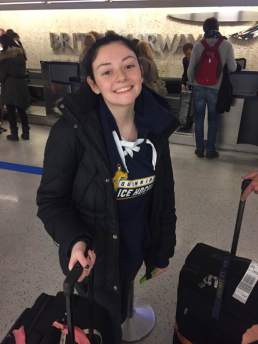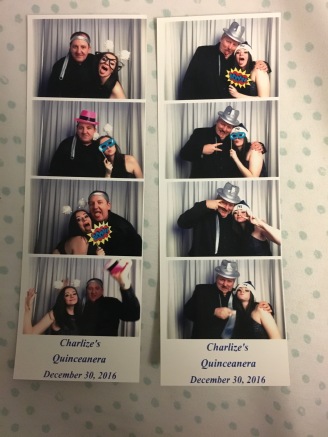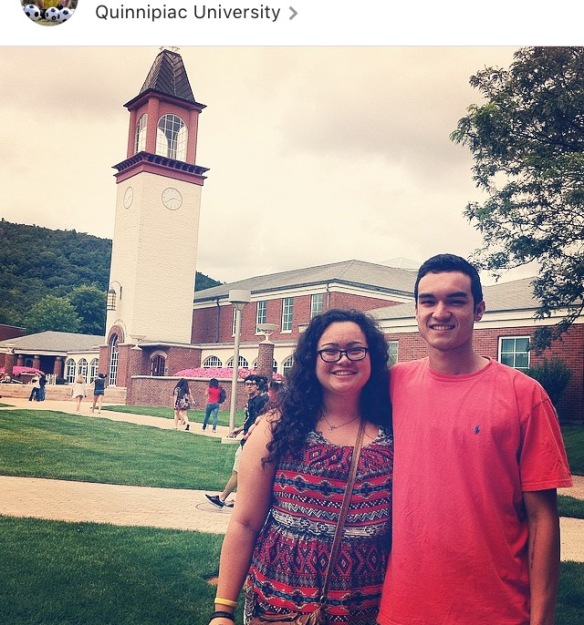The word I keep using to describe my experience in London so far is “surreal”. The dorm/house/apartment building (I’m not quite sure what to call it) that I’m living in is in Notting Hill, a very “posh” part of London, where my neighbor two doors down is designer Stella McCartney, around the corner is Jude Law’s house, and just up the road is Kensington Palace, the home of Prince William, Princess Kate, their children George and Charlotte, and Prince Harry. So far, we’ve been on a few walking tours of the city, and I’ve gotten to see so many historical places and famous monuments and attractions like Big Ben, the Houses of Parliament, the London Eye, Buckingham Palace, Westminster Abbey, Trafalgar Square, and so many more. As I walk down the streets and see how extremely well the old as been preserved and integrated with the new, I can only look on in awe. There have been many moments where I’ve just had to pinch myself. “Is this really happening?” I think to myself. Although I know deep down that everything I am experiencing is 100% real, I am still going through my days with a slightly-numb feeling that comes with the shock of temporarily moving to one of the most amazing cities in the world.
Saying goodbye to my parents at the airport was difficult, but as soon as I was on my own I felt fine. I have been keeping in touch with them through texts, and so far one FaceTime call per parent, but I don’t feel as sad and dependent on them as I did in those initial moments at JFK. Because I have a UK SIM card and Internet acc
ess, I think my separation has been (relatively) painless since I know that I don’t have to constantly be in touch with my parents and talk to them as much as I usually do, but the option is there if I really need them. I have also

at JFK before departing for London
remained incredibly distracted over the past week with all of the orientation events that have been going on with my program, IFSA-Butler, and with City University.
In addition to that, I definitely think my transition has been easier because I have been to London before, and culturally it is similar in a lot of ways to the United States, especially my hometown of New York City. I am very used to the hustle and bustle of a large city; being surrounded by many people from many different nationalities, taking public transportation, the large buildings and bright lights, and all the other things that come with city life. While some of the other students in my program are struggling with the London Underground and figuring out how to commute to our school, I feel like I’m back in high school again when I was commuting to and from school every single day. However, I do find myself comparing New York City and London a lot, and I think that’s not always the best thing. In Becoming World Wise, Slimbach quotes “intercultural expert” Janet Bennett (1998). She says, “At one and the same time, we value our old belief system as well as adaptation to the new; we seek a way to survive within our former worldview, and yet recognize the necessity for a new perspective … It is not merely ‘not knowing what to do,’ but it is more a case of not being able to do what one has come to value doing” (p.218). This quote really resonated with me because I think sometimes I am dwelling too much on my old belief system and trying to see London as New York when in reality they are two very different cities and I need to start seeing them that way instead of complaining that the Underground doesn’t run all night like the NYC subway system and that stores close too early. New York may be known as “The City That Never Sleeps” but London is definitely a city that sleeps. So my goal is to try to stop myself from making these comparisons and just enjoying London for what it is and learn how to adapt and not only live, but thrive in my new home with this new perspective.
In our workshop, we defined communitas as the group of people that are your “fellow liminoids”, going through a similar separation process and in a communitas all of the members are there to help get each other through challenges and make their rites of passage be as successful as possible. Slimbach says that communitas is “double-edged” because “Although it may provide vital social support, it can easily lead to stagnation in terms of cultural adjustment and learning”. I think I have found a group of girls in my program that make up my

my communitas of girls from the IFSA program
communitas, and while I have spent a lot of time with them I haven’t let them hold me back in any way. I think we have found a good balance in the fact that we are all comfortable doing things on our own such as going to the university for meetings or going shopping or just walking around our neighborhood, but at the same time we have also done things together that help us get to know our surroundings better like going out to pubs and clubs. I have always prided myself on the fact that I am very comfortable traveling alone and successfully navigating in unfamiliar places, and that combined with my comfort in big cities has made the transition smooth and my reliance on my communitas not as great. I think I have found myself in a place where I am very happy and comfortable in my new city that I’m worried I will suddenly be overcome with homesickness and have somewhat of a setback. But let’s hope that doesn’t happen.
Slimbach also talks about finding ways to cultivate a network of “close-knit and supportive [international] friends”. I think I am in a unique situation because I am very active on social media and over the years I have made friends with people who live in the United Kingdom and other parts of Europe such as France. When they found out about my plans to study abroad, they all offered to make plans to see me, or offered to show me around their home countries if I travel there. In fact, I am making plans for this weekend to see my friend that attends Middlesex University in London, although she is originally from Poland. I am hoping that connections like these will be a way for me to build this network that Slimbach refers to and that they will help me feel more integrated into the London culture.
The picture below was taken while I was on a walk with my friend who also goes to Quinnipiac and is doing the same program as me. It was one of the most memorable moments from my trip so far. We started out in Oxford Circus and walked our way down through Piccadilly Circus, past Buckingham Palace, through narrow streets and a residential area, down to the River Thames and over a bridge that had one of the most amazing views of Big Ben, Parliament, the London Eye, etc. I had ever seen. Plus, we got to the bridge around sunset, which added to the view’s beauty. This was where my astonishment came in about the integration of the old and new; blocks of old Victorian houses have remained in beautiful condition while just down the road brand new flats are being built, and nothing feels out of place. As I walked down the streets, I looked at all of these old homes, shops, cafes, etc., snuggled up against one another and I couldn’t help but feel like I was being pulled into them, as though they were welcoming me in a way. I have always felt a connection to this city since my first visit four years ago, and now it feels stronger than ever since I will be living here until April.
I think this picture best describes my journey so far because it showcases the beauty of London that has really captured my heart. It is also somewhat of a symbol of my journey because although I have been here before and had the chance to explore a bit in the past week, there is so much of this city that I haven’t seen yet and as I look down the river, I see all of the possibilities in front of me and I become even more excited for the weeks to come. Although I know that I will have to make more adjustments in order to fully become a member of the culture here and that I will most likely face more challenges in the next few weeks, I feel happy and optimistic because I know I will be able to overcome and make the most out of my somewhat short time here.




